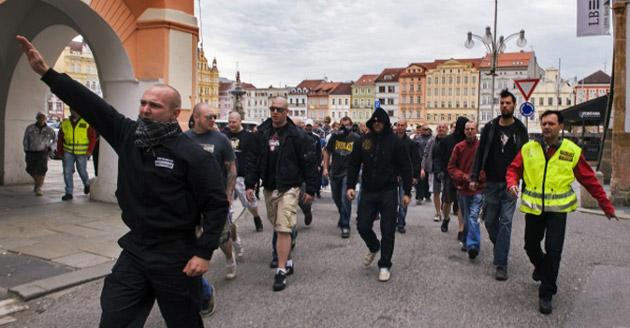Czech political scientist: "People feel the extremists are the only ones interested in them"

Miroslav Mareš, a political scientist and specialist on extremism, says that government inaction and failure to resolve the security situation is responsible for the current anti-Romani demonstrations in České Budějovice and other towns throughout the Czech Republic. "People feel the extremists are the only ones interested in them," Mareš told the on-line daily TÝDEN.CZ. News server Romea.cz presents that interview below in full translation:
Q: Does the latest anti-Romani commotion in České Budějovice and Duchcov mean Czech society is going a bit in the ultra-right direction?
A: Not exactly. This is not yet an expression of sympathy for parties that embody right-wing extremist ideology. Rather, I’d say that society is doing its best to somehow respond to the negative aspects of socially excluded localities, and yes, often that is transformed into blanket anti-Romani statements. Nevertheless, I don’t believe this is any sort of disruptive change. Similar sentiments have always existed here, in the 1990s and even earlier. However, what is new since 2008 is the form taken by these joint mass protests, where people from the right-wing extremist scene mess around with violence and ordinary citizens accompany them.
Q: Recently, of course, opinions approximating those on the extremist scene are being newly heard from the mouths of some politicians who are members of established, non-extremist parties….
A: You’re right. Even though they are not expressing any sympathy for historical Nazism, those condemnations of the Romani minority are generalizations and are sometimes even much harsher that what people from the ultra-right parties say themselves.
Q: The Czech Interior Ministry says in its report on extremism that nothing much is happening on the radical right-wing scene, that it’s stagnating. Do you agree with that?
A: When you look at the organized scene, not much is changing there, basically. Naturally, some new, small groups are surfacing, but they are too small. However, what is new is the rising support for drastic solutions among the entire population, which is publicly declaring that support. In my view, such support has always been here, but now people are determined to take to the streets because of it, to state those views together with the right-wing extremist scene. That is a trend of the past few years only.
Q: What do you think the cause of that trend is?
A: There are many factors: Dissatisfaction with one’s personal situation, which is then transformed into these complaints that Romani people (whether allegedly or in reality) live off of welfare and are not interested in working, and frustration with overall political developments is blended in there as well. I definitely would not underestimate the actual extent of the crime rates near those localities as factor.
Q: Do you think the government or the state administration are trying to do something about this and if so, how successful have they been?
A: I believe the government has totally failed to resolve the security situation. Not just this government, but several governments before this one – ordinary people have been left on their own to deal with this. They then have the feeling that the extremists are the only people who are interested in them.
Q: Might this impact the next elections?
A: Naturally it might, to a certain degree, but there are several parties doing their best to play the "Romani card", which could dilute the votes. Moreover, it must be said that while there are very strong anti-Romani prejudices in this society, those feelings are not the reason people vote for one party or another, with the exception of some neighborhoods immediately adjacent to those localities. That’s why I don’t think this will be the main topic of the next elections.